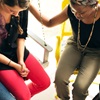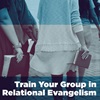Jesus often told people, "Your sins are forgiven." What a stunning statement. Forgiveness is powerful. Unforgiveness can also be powerful: when we refuse to forgive those who have wronged us, we ironically and powerfully hurt ourselves. Lewis Smedes once said, "Forgiving is the only way to be fair to yourself. Would it be fair to you that the person who hurt you once goes on hurting you the rest of your life? When you refuse to forgive, you are giving the person who walloped you once the privilege of hurting you all over again—in your memory."
Beyond the healing that forgiving someone who wronged us brings to our hearts, it is also commanded in Scripture.
Look up the following verses and talk about the steps to forgive.
A Quick Bible Study on Forgiveness
- We have been forgiven (Colossians 2:13-15).
- Forgive because you've been forgiven (Colossians 3:13).
- Forgiveness restores broken relationships (Genesis 50:17).
- Forgiveness is a path to love (Luke 7:47).
- Forgiveness precedes healing (Luke 5:17-26).
- God tells us to forgive instead of seeking revenge or bearing a grudge (Leviticus 19:18).
How to Forgive
- Realize and admit your part in the conflict.
- Ask Jesus, the ultimate forgiver, to empower you, remembering that he has forgiven you.
- Decide that you don't want to keep on letting that person hurt you by holding the grudge.
Discussion Questions:
- Why do you think it is difficult to forgive those who hurt you?
- Read Luke 5:17-26, the healing of the paralytic. What does this passage imply about the relationship between forgiveness and healing?
- How could extending forgiveness heal a relationship? How might it heal the other person? How might it heal you?
- Respond to the Lewis Smedes quote from above: "When you refuse to forgive, you are giving the person who walloped you once the privilege of hurting you all over again—in your memory." Do you agree or disagree? Why or why not?
- Share an example from your own experience when refusing to forgive hurt you.









